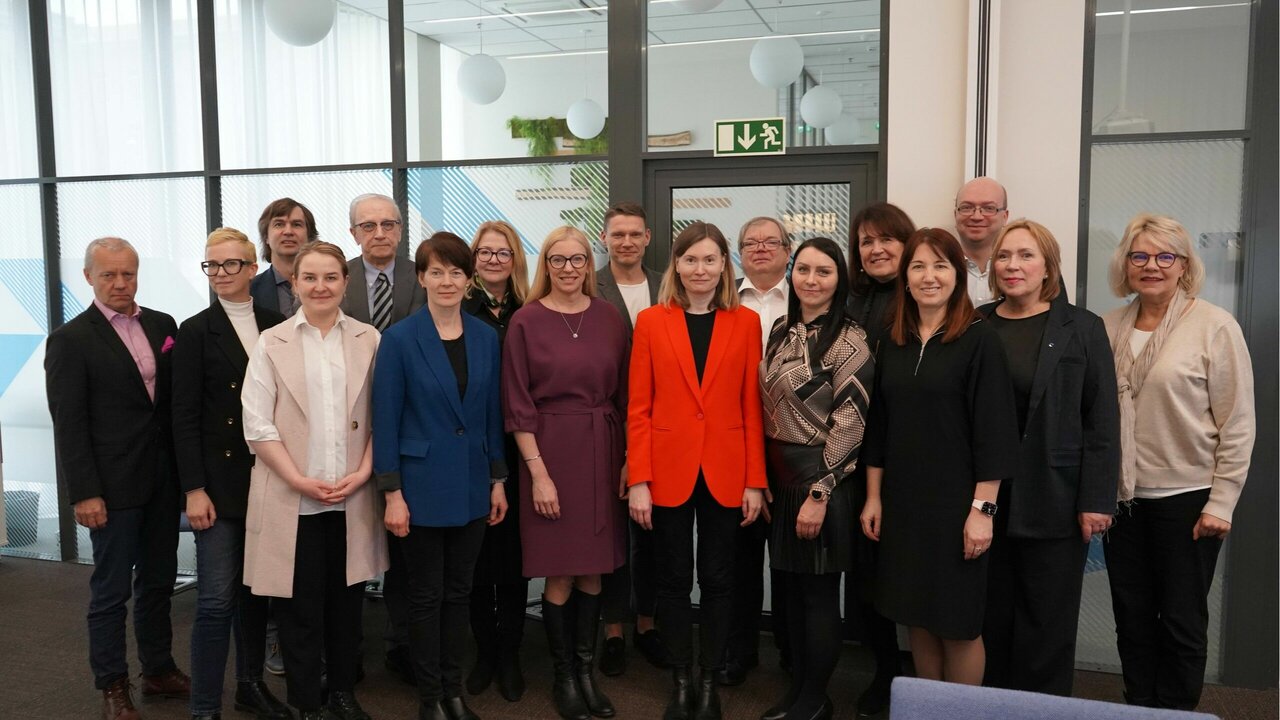-
Faculty of Arts and HumanitiesDean's Office, Faculty of Arts and HumanitiesJakobi 2, r 116-121 51005 Tartu linn, Tartu linn, Tartumaa EST0Institute of History and ArchaeologyJakobi 2 51005 Tartu linn, Tartu linn, Tartumaa EST0Institute of Estonian and General LinguisticsJakobi 2, IV korrus 51005 Tartu linn, Tartu linn, Tartumaa EST0Institute of Philosophy and SemioticsJakobi 2, III korrus, ruumid 302-337 51005 Tartu linn, Tartu linn, Tartumaa EST0Institute of Cultural ResearchÜlikooli 16 51003 Tartu linn, Tartu linn, Tartumaa EST0Institute of Foreign Languages and CulturesLossi 3 51003 Tartu linn, Tartu linn, Tartumaa EST0School of Theology and Religious StudiesÜlikooli 18 50090 Tartu linn, Tartu linn, Tartumaa EST0Viljandi Culture AcademyPosti 1 71004 Viljandi linn, Viljandimaa EST0Professors emeriti, Faculty of Arts and Humanities0Associate Professors emeriti, Faculty of Arts and Humanities0Faculty of Social SciencesDean's Office, Faculty of Social SciencesLossi 36 51003 Tartu linn, Tartu linn, Tartumaa EST0Institute of EducationJakobi 5 51005 Tartu linn, Tartu linn, Tartumaa EST0Johan Skytte Institute of Political StudiesLossi 36, ruum 301 51003 Tartu linn, Tartu linn, Tartumaa EST0School of Economics and Business AdministrationNarva mnt 18 51009 Tartu linn, Tartu linn, Tartumaa EST0Institute of PsychologyNäituse 2 50409 Tartu linn, Tartu linn, Tartumaa EST0School of LawNäituse 20 - 324 50409 Tartu linn, Tartu linn, Tartumaa EST0Institute of Social StudiesLossi 36 51003 Tartu linn, Tartu linn, Tartumaa EST0Narva CollegeRaekoja plats 2 20307 Narva linn, Ida-Virumaa EST0Pärnu CollegeRingi 35 80012 Pärnu linn, Pärnu linn, Pärnumaa EST0Professors emeriti, Faculty of Social Sciences0Associate Professors emeriti, Faculty of Social Sciences0Faculty of MedicineDean's Office, Faculty of MedicineRavila 19 50411 Tartu linn, Tartu linn, Tartumaa ESTInstitute of Biomedicine and Translational MedicineBiomeedikum, Ravila 19 50411 Tartu linn, Tartu linn, Tartumaa ESTInstitute of PharmacyNooruse 1 50411 Tartu linn, Tartu linn, Tartumaa ESTInstitute of DentistryL. Puusepa 1a 50406 Tartu linn, Tartu linn, Tartumaa ESTInstitute of Clinical MedicineL. Puusepa 8 50406 Tartu linn, Tartu linn, Tartumaa ESTInstitute of Family Medicine and Public HealthRavila 19 50411 Tartu linn, Tartu linn, Tartumaa ESTInstitute of Sport Sciences and PhysiotherapyUjula 4 51008 Tartu linn, Tartu linn, Tartumaa ESTProfessors emeriti, Faculty of Medicine0Associate Professors emeriti, Faculty of Medicine0Faculty of Science and TechnologyDean's Office, Faculty of Science and TechnologyVanemuise 46 - 208 51003 Tartu linn, Tartu linn, Tartumaa ESTInstitute of Computer ScienceNarva mnt 18 51009 Tartu linn, Tartu linn, Tartumaa ESTInstitute of GenomicsRiia 23b/2 51010 Tartu linn, Tartu linn, Tartumaa ESTEstonian Marine Institute0Institute of PhysicsInstitute of ChemistryRavila 14a 50411 Tartu linn, Tartu linn, Tartumaa EST0Institute of Mathematics and StatisticsNarva mnt 18 51009 Tartu linn, Tartu linn, Tartumaa EST0Institute of Molecular and Cell BiologyRiia 23, 23b - 134 51010 Tartu linn, Tartu linn, Tartumaa ESTTartu ObservatoryObservatooriumi 1 61602 Tõravere alevik, Nõo vald, Tartumaa EST0Institute of TechnologyNooruse 1 50411 Tartu linn, Tartu linn, Tartumaa ESTInstitute of Ecology and Earth SciencesJ. Liivi tn 2 50409 Tartu linn, Tartu linn, Tartumaa ESTProfessors emeriti, Faculty of Science and Technology0Associate Professors emeriti, Faculty of Science and Technology0Institute of BioengineeringArea of Academic SecretaryHuman Resources OfficeUppsala 6, Lossi 36 51003 Tartu linn, Tartu linn, Tartumaa EST0Area of Head of FinanceFinance Office0Area of Director of AdministrationInformation Technology Office0Administrative OfficeÜlikooli 17 (III korrus) 51005 Tartu linn, Tartu linn, Tartumaa EST0Estates Office0Marketing and Communication OfficeÜlikooli 18, ruumid 102, 104, 209, 210 50090 Tartu linn, Tartu linn, Tartumaa EST0Area of Vice Rector for DevelopmentCentre for Entrepreneurship and InnovationNarva mnt 18 51009 Tartu linn, Tartu linn, Tartumaa EST0University of Tartu Natural History Museum and Botanical GardenVanemuise 46 51003 Tartu linn, Tartu linn, Tartumaa EST0International Cooperation and Protocol Office0University of Tartu MuseumLossi 25 51003 Tartu linn, Tartu linn, Tartumaa EST0Area of RectorRector's Strategy OfficeInternal Audit OfficeArea of Vice Rector for Academic AffairsOffice of Academic Affairs0University of Tartu Youth AcademyUppsala 10 51003 Tartu linn, Tartu linn, Tartumaa EST0Student Union OfficeÜlikooli 18b 51005 Tartu linn, Tartu linn, Tartumaa EST0Centre for Learning and TeachingArea of Vice Rector for ResearchUniversity of Tartu LibraryW. Struve 1 50091 Tartu linn, Tartu linn, Tartumaa EST0Grant Office
University of Tartu will be home to the Estonian Cancer Centre

The University of Tartu and the Ministry of Social Affairs have signed a cooperation agreement to establish the Estonian Cancer Centre within the Faculty of Medicine of the University of Tartu to accelerate cancer prevention and treatment in Estonia through international cooperation. The further goal is to earn EU accreditation as a Comprehensive Cancer Centre in the next four years. To launch the centre, the Ministry of Social Affairs received €2.6 million of research and development funding from the government.
Minister of Health Riina Sikkut said the decision to establish the cancer centre at the University of Tartu Faculty of Medicine was based on the primus inter pares principle – the highest potential among equals was chosen. “Our decision as the funder of the centre was not just to set up another foundation, but to plant the new cancer centre in an environment where the academic and clinical parts and the culture of implementation are well balanced,” the health minister explained.
Riina Sikkut admitted that although Estonia has made significant efforts in cancer prevention in recent years, the cancer burden is still high. “In cancer control, we must be one step ahead of the disease. Research, participation in studies and international cooperation are crucial in cancer prevention, diagnosis and treatment. This is precisely what the new centre will enable us to do,” said the health minister, underlining the importance of the cancer centre.
Education, research and clinical work in cancer prevention and treatment have so far been quite fragmented and divided between different institutions in Estonia. Sander Pajusalu, the Vice Dean for Development at the University of Tartu Faculty of Medicine, said the Estonian Cancer Centre aims to create a nationwide unified network bringing together cancer treatment, research, educational institutions and patient organisations and facilitating participation in international projects. “In cooperation, we want to effectively implement the goals of the Cancer Control Plan for 2021–2030. The centre will be a hub for international and domestic cooperation in cancer. The cancer centre will represent the country in international cancer programmes to develop the field and reduce cancer incidence in Estonia,” said Pajusalu.
According to Agris Peedu, Chairman of the Board of the North Estonia Medical Centre, further efforts and closer cooperation are needed to ensure that Estonian cancer patients receive modern oncological treatment in their home country. “Establishing a national cancer centre is a significant step. At the North Estonia Medical Centre, the largest cancer centre in Estonia, we see that we need increasingly more research and funding in Estonia, and the Cancer Control Plan drawn up by our oncologists years ago has to be implemented centrally. I believe that launching the Estonian Cancer Centre at the University of Tartu will make all this possible,” said Agris Peedu.
The Estonian Cancer Centre’s partners are the Ministry of Social Affairs, the Health Insurance Fund, the North Estonia Medical Centre, the Tartu University Hospital, the East Tallinn Central Hospital, the Tallinn Children’s Hospital, the University of Tartu, the Tallinn University of Technology, the National Institute for Health Development and the Estonian Cancer Society.
The Estonian Cancer Centre project manager Kadi-Liis Veiman said the summer ahead will be busy. “We have already secured two grants for the cancer centre through the Government Office’s innovation fund: one for cell therapy development and the other for developing a structured cancer data management dashboard,” Veiman said. In the next step, the partners will agree on the centre’s governance structure and decision-making principles. “For example, we need to decide which EU cancer projects are the most important to get involved in and what role we should play in them. Cancer is a common concern in Europe, and there are many projects and initiatives in this field. We have to identify the most important ones for Estonia, bearing in mind the needs of patients,” said Kadi-Liis Veiman.
The €2.6 million grant for establishing the cancer centre will be spread over four years. During this period, the centre aims to achieve EU accreditation as a Comprehensive Cancer Centre. In the first year, the cancer centre’s budget is €650,000. The funding was awarded in last year’s call for proposals for research and development funding from sectoral ministries. The proposals were assessed by the Research and Development Council of the government of Estonia.
The Estonian National Cancer Control Plan has set three priorities for 2021–2030: fewer people have cancer, people live longer after a cancer diagnosis and have healthier lives, and people with cancer have a better quality of life.
According to the National Institute for Health Development, more than 8,000 cancer cases have been diagnosed annually in recent years. In 2022, the Health Insurance Fund covered the treatment of 51,000 individuals with malignant tumours, supporting their cancer surgeries, treatments, and medications with more than €171 million. The number of registered cancer deaths in Estonia in 2023 was 3,391, a couple of hundred down compared to 2021.
Read more similar news





